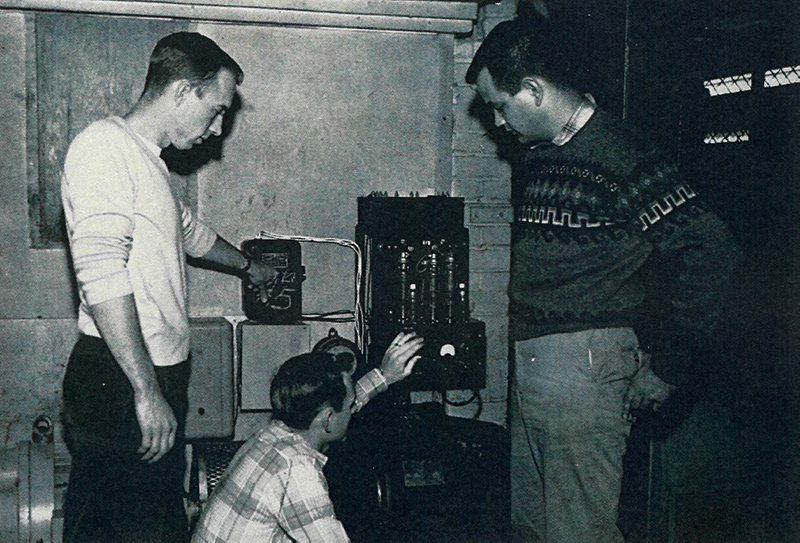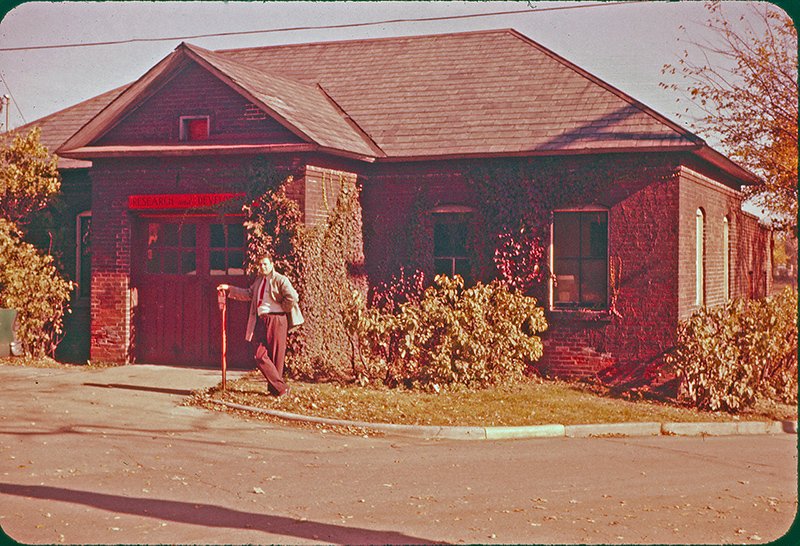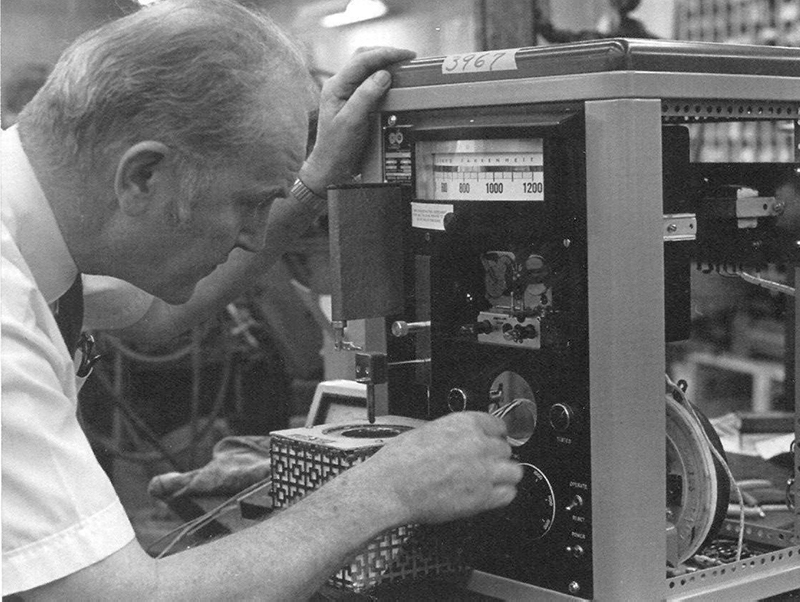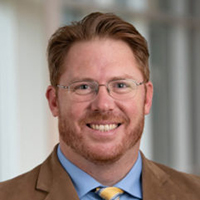Regardless of their generation or graduation year, many of our alumni share that Indiana Tech represents family. Due to our Midwestern roots, our intimate learning environments and our cohesive approach to practical application, this is a resounding theme whenever alumni reflect on their time here. For some, it is symbolic in its familial representation, for but for Greg Dermer ’77 BSEE that sentiment is quite literal.
Greg’s unique ties to this institution exist not only through the education he received here during the economic challenges of the 1970s but much more so because of his father Richard Dermer ’35 BSEE alum, professor and deeply-rooted friend of the university.
As early as he could remember, Greg’s father included him on the exploration of problem solving. In labs on campus or in the basement at their Fort Wayne home, Richard was always demonstrating how to solve a problem and how to make things work better.
Greg’s curiosity of how and why things work the way they do took shape from an early age, all from his father’s example. Greg watched what his father did professionally and around the house and witnessed his father’s practicality to both household and industrial-sized challenges. While Richard rarely brought work home with him, Greg would watch his father work on projects for their home, neighbors and friends, and their church only to be drawn in with genuine curiosity. Moreover, he was regularly brought to campus to see the labs, the projects and the technology in various engineering programs to further strengthen that curiosity.
“My father’s work in electrical engineering and later in radio engineering had profound influences on me. I was always around it. He had many projects around the house and I was able to learn through proximity. I remember when I was 5 or 6 years old, I was first introduced to the hands-on learning my father promoted during his teaching. He built a workbench and provided me with my own tools which allowed me to learn by exposure because I was so naturally inquisitive.”

One of the first Christmas presents Greg remembers receiving from his father was a board with switches, lights, relays and meters: all electrical engineering components that included binding posts to wire that allowed him to understand how to route electricity through them. The hand-lettered schematics allowed him to learn, at a very young age, how electricity worked. “I blew a lot of fuses that year, but it taught me not only about the way things worked but how to problem solve real-world situations. It is all just puzzles.”
“He (Richard) loved teaching, but hated grading papers most. Though he would, he didn’t like to give people bad grades on papers because he understood that learning was much more than the writing. It was about the practical application of information to a situation, problem solving and collaboration.” All of which Greg regularly saw and applied in his own home and professional life.
Greg’s reflection on his father’s impact and influence goes well beyond what he himself gained from his father’s adeptness for effective teaching. Greg beamed as he shared that “students seemed to love him. He often became friends with many after the fact. I recall him receiving gifts of all kinds from former students. Things like bottles of scotch and Arabian dates from Middle Eastern students were common.”

Research and Development, a Natural Fit
Just prior to Greg entering Indiana Tech, his father established the Research and Development Center at Indiana Tech which moved him out of the classroom but supplanted him in his true passion of problem solving. Since this was an industrial town and Indiana Tech was an engineering school, it was not uncommon in those days that Richard was approached by local companies and corporations to help them test equipment, research failures or investigate improvements. During his undergrad, Greg worked there from time to time alongside his father to get through college and satisfy that curiosity of “how things worked” and “why things are.” Some of the projects they worked on included testing magnet wire, concrete, welds and more for companies including Gray, GE and Essex among others.
An Independent Kid…
While he was exposed to the elements of electrical engineering at a young age, Greg found his niche in computer engineering. He was just fascinated by it all: the possibilities, the problem solving and the innovation.
“It was never about it being the ‘next big thing’ or the boom to come, it was about my genuine awe of what technology could do and the puzzles it would create as challenges.”
After various stints with computer companies, Greg found his way to Intel and retired from there 15 years later. “It involved a lot of long hours and it wasn’t uncommon to work six or seven days in a row to get the job done, but everybody loved what they were doing so it wasn’t hard work. I still got to do what I loved: dink around and do stuff, make stuff, change stuff. But it was all possible because of the background of what was done before with my father.”
…with a Foundation for Enabling Discovery
When asked if he’d ever considered following in his father’s footsteps into teaching, Greg laughed and said no, because he (Greg) “didn’t make time to do it.” Professionally, he ran multiple professional development sessions and mentored younger engineers who worked beneath him. He has always been able to engage with his community and do volunteer work which he genuinely enjoys. Linda, his wife, thinks he should have been a teacher but he carries on his father’s traditions of celebrating curiosity and inquisitiveness of his family and those for whom he continues to volunteer within his community.
Greg shared, “I enjoy imparting something, instilling something in others whether teaching students how Roman numerals work, or introducing my niece studying computer science at Oxford and distant nephew studying engineering in Germany to the inner workings of steam engines during travels in Europe. I thought we would be through the steam museum in London in half an hour…four hours later, we were still there answering their questions.”
Dedication in Tech’s Difficult Times
Both Greg and his father saw Indiana Tech through some exceptionally difficult times in its history. Richard witnessed the financial challenges of the Great Depression and country’s focus on World War II efforts that nearly shuttered the doors of the young Indiana Technical College. During that time, Richard split his time between the classroom and General Electric before rejoining the university full time once traction was regained.
Greg himself was a student through the university’s economic fallout in the 1970s recalling, “Once a quarter, President (Charles) Terrell (1972-77) gathered all 350 of us Indiana Tech students in the student center adjacent to the quad and told us, ‘It looks like we will be able to stay open another quarter.’ That was a hard time for engineering. We were privileged to have had a hand-to-mouth benefactor in Ed Schaefer, the founder of Franklin Electric, to bail the school out.”
The fact that both of these individuals stuck through the challenges, the tougher times in the school’s history when so many students were jumping ship as other universities began shuttering their doors is a testament to what Indiana Tech has meant and continues to mean to their family.
A Lasting Legacy
In the 1970s, Richard was given an honorary doctorate for his dedication and service to the university. To further reinforce the impact that Richard had on students in his 42 years associated with Indiana Tech, a scholarship was established in his name in 2007 to which Greg continues to contribute. Though he’s never met the friends of his father who established it, he is glad that they did. This scholarship continues to serve students pursuing engineering “in hopes to inspire the next Einstein or Edison.”

Greg’s curiosity and his inherited habit of tinkering have not stopped in his retirement, though they are now more strictly hobbies. With mills, lathes, presses and welding equipment he collected when the main campus went through major renovation, he can regularly be found in his workshop creating special items for local businesses or replacement pieces for household items or car parts.
Do you have a story you’d like to tell about your time at Tech? Contact Matt Brown at MJBrown@IndianaTech.edu to share!
